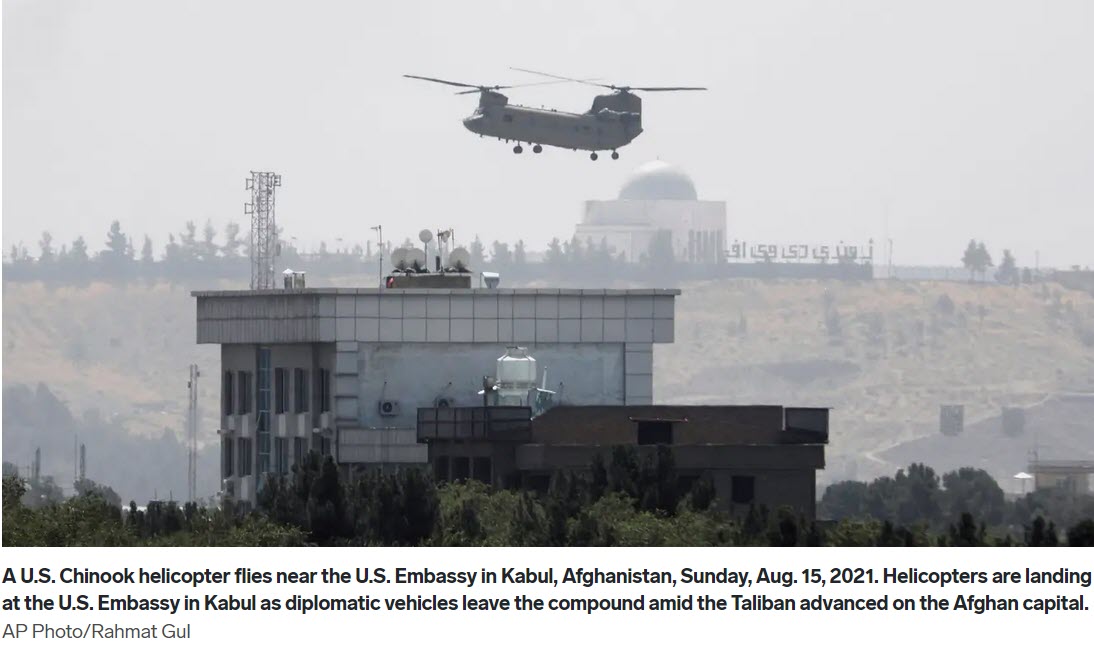Kbg wrote: ↑Tue Aug 17, 2021 8:33 am
glennds wrote: ↑Mon Aug 16, 2021 1:49 pm
Kbg wrote: ↑Mon Aug 16, 2021 1:18 pm
Leaving Afghanistan was a bipartisan foreign policy decision. Trump started the exit, Biden finished it.
Everything we are seeing now is A) to sell news and B) for posturing/CYA
Love or hate Biden, his statement “One more year, or five more years, of US military presence would not have made a difference if the Afghan military cannot or will not hold its own country."
is spot on.
Making a foreign policy decision and executing a foreign policy decision are two different things.
Biden will own the execution of this decision even if it was Trump who made it.
A big amen brother, execution is always the hardest part by far. What doubly sucks is the opposing side is deliberately trying to screw you up. And, on top of they they usually A) don't tell you what their plans are, and B) gasp, they no kidding lie a lot/try to deceive you.
Monday morning quarterbacking is easy, tell us what would you have done differently?
I must have missed the part where I was money morning quarterbacking. I have speculated whether the cost/risk of staying is lower than the cost of leaving. And I drew a distinction between the decision to leave and the execution of it. I noticed you and Kriegs took a position in the other thread on this subject, with which I have not disagreed but said time will tell.
What would I have done differently? Well let's see. If the original premise was sound, namely that Afghanistan under control of the Taliban was a safe harbor and breeding ground for terrorists, which in turn is a threat to U.S. national security, then yes, exerting our influence there was a valid thing to do in light of having been attacked by terrorists.
But if we are to exit, logic says it should be either because we (i) have now concluded that our original premise for being there was invalid OR (ii) the threat has been resolved and Afghanistan is no longer a safe harbor and breeding ground for terrorists. If we can't say either of these things, then what's the reason for our departure? Because it's a forever war, and we've lost our will to stay committed? Is that the message to send to the world? Or should we care?
Our last administration adopted an isolationist policy, that we should not be the police in the rest of the world. This was a radical departure from post-WWII activist doctrine that was been in place for 65 years.
On the execution part however, I am not too bashful to say planning for the exit should have made provision for those that assisted the US during the occupation, knowing the personal risk to those people of eventual retribution from the Taliban if we just abandoned them.
Does it take a monday morning quarterback or a crystal ball to consider that, or might it be basic common decency?
But I do find it interesting that according to Gallup, in 2001 nine out of ten Americans were supportive of the Afghan war.
Today, I would speculate that 90% of those supportive recall themselves being in the 10% camp.
Kbg wrote: ↑Mon Aug 16, 2021 1:18 pm
Also, please in your response answer this question: Was the country your poured 1T, most of it going to the military, expected to collapse in a couple of week. Or if that one is too tough because you aren't an expert, tell us if you are going to be in a car accident within the next six months and where?
Great question. So great, in order to answer it, I would beg to see the intelligence we presumably had on the question. Was the two week collapse a complete blindside, or was there intelligence that attributed some meaningful % of likelihood to it? Do you think military outcomes are as random as car accidents? Or are they analyzed using the most sophisticated game theory, considering knowns, unknowns, intelligence and dozens of other inputs?
Question for you - Would you know whether the decision to leave and the manner in which it was executed squared with the advice of the Pentagon?
Of course we live in an age where no news can be trusted, but the get-out-of-Afghanistan decision from the White House coincided with a time when Esper was fired as Secretary of Defense and supposedly a leadership purge happened at the Pentagon. You and I will probably never know who was the tail and who was the dog, but I am suspicious of a White House pull-out announcement made on November 17, 2020 (in the midst of election chaos), calling for substantial withdrawal by "mid-January", a mere 60 days and total withdrawal by May. Trump was on record saying we "should" be out by Christmas. What does that tell you?
Question 2 - What advice did Biden get from the Pentagon and Intelligence community regarding staging of the withdrawal?
If you only get to choose one or the other, what's worse, the so-called never ending wars that 90% of Americans supported at the outset, or the vacuum we leave behind after withdrawal?
In Vietnam, withdrawal didn't make us any less safe. So we can now say the never ending war would have been worse in Vietnam.
Time will tell on this one.
Thank you for the discussion.



